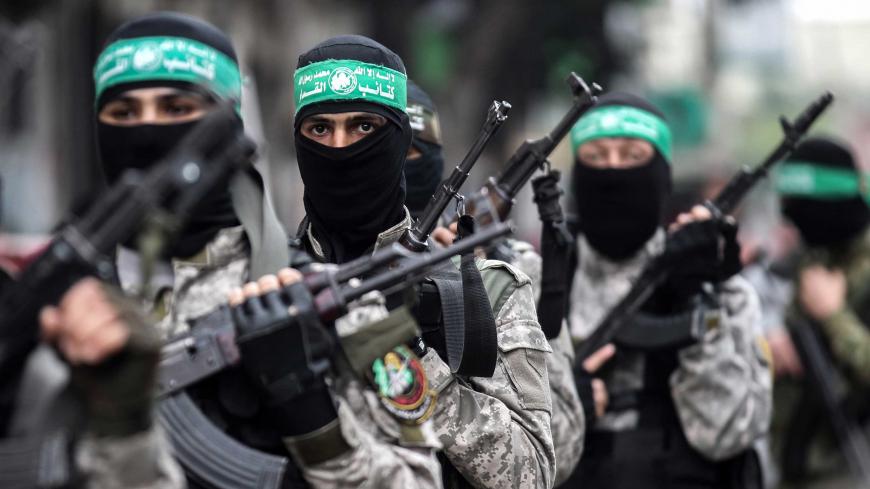On Aug. 12, Haaretz reported that Israel had planned in recent months to kill senior Hamas officials in the Gaza Strip in response to the Great March of Return protests at the border fence that started on March 30.
According to the report, the Israeli army and the Shin Bet security service believe that assassinating Hamas leaders is a better option than a wide-scale attack on Gaza, which would most likely entail ground troops.
The reports and threats sparked an online response by Hussam Badran, a senior Hamas official and spokesman. Badran posted on Facebook, “Israel’s rhetoric and threats to return to the policy of assassinating Hamas leaders is ludicrous and points to their dilemma and confusion.”
“Those threats don’t scare a Palestinian child, let alone the leaders of the resistance. All of the Palestinian people’s blood is precious, and the days where Israel spills the Palestinians’ blood without receiving response to its crimes are long gone,” Badran added.
Izz ad-Din al-Qassam Brigades, Hamas’ military wing, issued a Hebrew statement in response to the reports, that read, “It’s preferable for the enemy not be carried away by illusions; any stupid act that will come from its direction will result in destruction and an unbearable pain. It will be something the enemy has never experienced before in terms of both quantity and quality.”
Hussam al-Dajani, a political science professor at Al-Ummah University in Gaza, told Al-Monitor, “The policy of the Israeli assassination of the Palestinian factions’ leaders, if implemented, will drag the region toward a new vicious cycle of violence and instability that will affect regional and international security and peace.”
“The Palestinian resistance will feel obliged to defend itself and its people, so this assassination policy will surely take the scene between Israel and Hamas into a full military confrontation scenario that will result in massive human and material losses,” he added.
There’s a precedent for this. In the 2012 war, when an Israeli strike killed al-Qassam Brigades chief Ahmed al-Jabari, Hamas retaliated harshly and struck Tel Aviv with multiple rockets for the first time since the Gulf War in 1991. Unlike previous escalations when Hamas rockets reached only as far as Ashkelon and Ashdod, Hamas struck the heart of Israel.
In that war, Hamas made a considerable effort to deter Israel from targeting its leaders. The movement sent the message that a comprehensive military escalation would follow every time Israel targeted a Hamas leader.
Prior to 2005, Israel’s assassination of Palestinian resistance leaders, especially Hamas leaders, was a recurring event. The most notable assassinations were al-Qassam Brigades head Salah Shehada with an F-16 bomb in July 2002, Hamas leader Sheikh Ahmed Yassin in March 2004 with an Apache missile, and Yassin’s deputy leader Abdel Aziz Rantisi a month later also with an Apache missile.
“But this is not 2004,” political commentator Ibrahim Madhoun told Al-Monitor, adding, “Hamas now has the capacity to strike back as it did in 2012 in a way that would complicate the calculations of Israel’s decision-makers. Israel realizes that the costs of such a decision will far outweigh any achievements, if it does achieve anything at all.”
“Hamas is a hierarchical organization. … If Israel assassinated a Hamas senior, another one would just take his place, without any significant change to the movement as a whole, its ideology and the way it operates,” Madhoun added.
It is widely believed among Palestinian analysts that Hamas would retaliate with a full military escalation if Israel assassinated any of its leaders. However, in October 2015, the content of a secret meeting between senior Hamas leader Mahmoud al-Zahar and Marwan Issa, the head of Hamas’ military wing, was revealed to the public. According to the report, Issa told Zahar that al-Qassam Brigades will not respond to any Israeli escalation no matter what, even if Israel targeted Hamas leaders.
Issa said, “We have fought three wars, and we have not achieved anything,” to which al-Zahar concurred.
But that was 2015, only one year after Operation Protective Edge, which was a traumatic experience for Hamas due to the massive destruction that befell Gaza along with the lack of achievements on Hamas’ part. The situation in 2018 may be different. Hamas showed a willingness to retaliate when it recently launched 180 rockets into southern Israel in answer to Israel targeting two of their combatants. But the 2015 secret meeting suggests that the situation may not be as black and white as saying that Hamas will surely retaliate.
The defense sources quoted in the abovementioned Haaretz article said that the assassination of a senior Hamas figure could trigger “a harsh response” by Hamas and a military campaign.
The report also added that, up till now, “Israel has decided not to carry out these assassinations in order to exhaust the efforts by Egypt and the United Nations to broker a political arrangement instead.”
Despite the escalations on the borders and heated rhetoric in recent months between Hamas and Israel, Hamas’ No. 1 priority now remains reaching a long-term cease-fire that includes reinvigorating Gaza and easing the pressure on its caged population.
Since the start of the March of Return protests, Hamas’ goal throughout the protests has been to put the issue of Gaza back on the international agenda and put pressure on Israel to lift the blockade, which devastated all aspects of life in the Gaza Strip.
Hamas’ efforts have partially paid off, as there have been indirect talks in recent weeks between the Islamic movement and Israel with the mediation of Egypt and the UN to reach a long-term truce. The truce would include ending the March of Return protests in exchange for a significant alleviation of the siege along with humanitarian gestures.
“The Palestinian resistance factions have unilaterally agreed and made it clear that their strategy is defensive. As long as Israel does not target their leaders, combatants and the population, any potential cease-fire and calm will hold, and the opposite is true as well,” Dajani said.
Israeli Prime Minister Benjamin Netanyahu and army generals view the truce as an opportunity to alleviate the humanitarian crisis in Gaza, which they view as detrimental to Israel’s security. Also, a truce with the Gaza Strip is viewed by Israel as an opportunity to focus on the threat in the north: Iran’s presence in Syria along Israel’s northern border.







